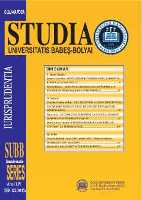DE L’EXCEPTION A L’ETAT D’EXCEPTION : LES REGIMES PRIVE ET PUBLIC DE L’EXCEPTIONNALITE EN DROIT ROMAIN
EXCEPT FOR THE STATE OF EMERGENCY: THE SCHEMES PRIVATE AND PUBLIC EXCEPTIONALISM IN ROMAN LAW
Author(s): Claudia-Cristina ŞerbanSubject(s): Law, Constitution, Jurisprudence
Published by: Studia Universitatis Babes-Bolyai
Summary/Abstract: Our study intends to offer a characterization of the juridical regime of exceptionality in Roman law, embracing both private and public fields, in order to identify the mechanism that exception follows in each case. At first, a semantic analysis of the term has allowed us to identify the key element for a unified juridical meaning: the exception reveals itself every time as a crucial defense means. This aspect helps to partially neutralize its tension with the norm: the role of the exception begins at the exact point where the norm becomes unable to protect a certain fundamental interest. But this teleological horizon doesn’t remain the same as we pass from private to public law: if private law easily legitimates exception as an efficient means to defend an individual right, in return public law invokes exceptional measures when the salvation of the State is at stake, thus suspending the same individual rights previously defended. We have tried to follow this conflict of values by confronting the function of exception in private Roman law, and the effects of exceptional measures in public Roman law. Regarding private law, we were able to notice that a protectionist finality openly commands the historical apparition of exception: as a secondary and accidental part of the formula, exception complexifies a juridical situation by taking into account a significant factual element, such as dolus or metus in the emblematic cases of exceptio doli and exceptio metus. Nevertheless, in its defense means quality, exception tends to fade in profit of other protection mechanisms, namely the restitutio and the actio. Roman public law, on the other hand, presents several institutions corresponding to the effort of encompassing and responding to exceptional factual circumstances: dictatorship, justitium and senatus consultum ultimum. We have retained the latter (against Giorgio Agamben, for instance, who tends to overestimate justitium) as the privileged figure in Roman history of what we call now the state of exception. The senatus consultum ultimum, in its proclaimed teleological function of a means to the Republic’s salvation, allows the roman Senate to suspend a number of essential civic guarantees, thus becoming an ambiguously placed institution, at the crossroads between law and politics. From exception to the state of exception, we are thus confronted to an inversion of finalities, which has the meaning of a potential and imminent transgression of individual rights.
Journal: Studia Universitatis Babes Bolyai - Iurisprudentia
- Issue Year: 54/2009
- Issue No: 1
- Page Range: 59-86
- Page Count: 28
- Language: French

